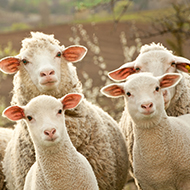Observing pregnant ewes could help with lambing management - study

"Observing changes in lying bouts and detecting contractions could assist farmers in monitoring parturition and ultimately enhancing sheep husbandry.”
Observing behavioural changes in sheep could help farmers with lambing management, according to new research.
The study by Hartpury University set out to see if pregnant ewes changed their behaviour before giving birth. The team followed 17 sheep housed together at six weeks before lambing and recorded their observations.
They found that the sheep spent most of their time either standing or lying during pregnancy. Pregnant ewes laid down for around 10 hours per day and stood for an equivalent amount of time – a ratio similar to other ruminant species like cattle.
The team also found that the frequency of lying bouts, including contractions, increased before having their lambs.
Pregnant ewes spent much of their time either lying or standing, with a higher frequency of standing and shuffling bouts. Ewes that needed help with lambing had more walking bouts compared to ewes that did not receive help.
Concluding the study, researchers note that monitoring behavioural patterns, such as lying and contractions, could alert farmers to the progress of parturition.
A Hartpury spokesperson said: “Lambing is a critical time for sheep farmers across the UK and around the world, and large flocks present several challenges when trying to monitor individual animals. There are surprisingly few studies investigating the duration and frequency of behaviours of pregnant sheep, so I was delighted to be able to support this important research.
“The study paves the way for future research as it appears that observing changes in lying bouts and detecting contractions could assist farmers in monitoring parturition and ultimately enhancing sheep husbandry.”



 The Animal and Plant Health Agency (APHA) has updated its online reporting service for dead wild birds.
The Animal and Plant Health Agency (APHA) has updated its online reporting service for dead wild birds.